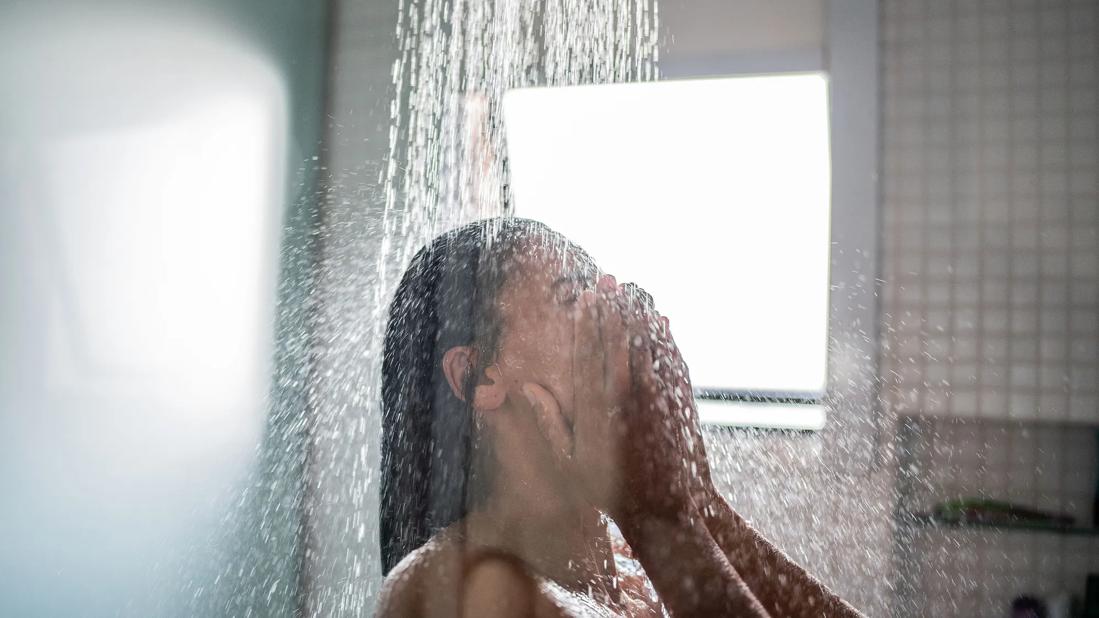While it may seem harmless, showering — or even swimming or washing your face — with contacts in can cause sensitivity to light, irritation and even an infection

Image content: This image is available to view online.
View image online (https://assets.clevelandclinic.org/transform/ad100901-4309-4b84-8671-4ad8a79ea5ae/showering-1385946677)
Person in shower, with water running over their face
If you wear contact lenses, chances are that you like to wear them all day long — for example, to work, to make dinner and even to watch your favorite TV show.
Advertisement
Cleveland Clinic is a non-profit academic medical center. Advertising on our site helps support our mission. We do not endorse non-Cleveland Clinic products or services. Policy
But can you shower with contacts? You need to see what you’re doing, right?
Unfortunately, that simple daily task can lead to major issues if you’re wearing contacts. So, make sure you take out your contacts first!
Optometrist Reecha Kampani, OD, explains why showering with your contacts in could lead to symptoms like dry or watery eyes, sensitivity to light, irritation or even an infection.
Bottom line? No.
“Don’t swim, shower, bathe or wash your face with your contacts in. Anytime you’re doing something that involves water near your eyes, you’re potentially at risk for an infection,” stresses Dr. Kampani. “Water has microorganisms that can be harmful to your eyes.”
If your contact lenses are in, water (and all those germs) can get trapped under the lens. In some cases, you may have damage to your cornea (maybe just a small scratch) and that can allow germs to easily get into your eye.
But does it matter if you wear hard contacts or soft contacts?
“Soft contact lenses have a higher risk than hard contacts because they’re more porous and are the perfect breeding ground for bacteria,” explains Dr. Kampani. “But in all scenarios, you’re still at risk.”
She adds that you should even remove extended-wear contacts before showering.
Advertisement
Dr. Kampani says that showering with contacts in can lead to symptoms like:
While most of these symptoms may seem annoying at most, you should still take them seriously. For example, water can cause your soft contact lens to stick to your eye, causing irritation, but it can also lead to corneal damage.
And if you have an eye infection, it can lead to more serious issues like vision loss. In fact, there’s a whole host of eye infections out there that you may experience, from pink eye to microbial keratitis.
“Microbial keratitis is an infection of your cornea,” shares Dr. Kampani. “And that can cause a corneal ulcer.”
“To be on the safe side, take out your contacts and clean them,” advises Dr. Kampani. “You could also replace your contact lenses if you’re concerned about something getting in your eye through your contact.”
You may even want to consider taking a break from your contacts for a few hours. And if you notice any eye-related symptoms, you should talk to your eye doctor immediately.
No. Dr. Kampani says that the same issues can happen even if you’re just giving your face a quick scrub. Even if your eyes are closed, there’s a chance that water can get in and become trapped under your contact lens.
We know we sound like a broken record, but to lower your risk of an eye infection and other symptoms, you want to make sure to avoid getting water near your eyes while you have your contacts in.
That means remove your contacts before you shower, bathe, wash your face, swim or even splash some cold water on your face.
While it seems harmless, getting water in your eyes while wearing contact lenses can be bad for your eyes. It can cause symptoms such as sensitivity to light, dry or watery eyes, irritation and even an eye infection.
If you’re currently someone who keeps their contacts in while showering, it may be beneficial to change your habits and make sure you remove your contacts before stepping underneath your showerhead.
“The best thing you can do is to remove your contacts before showering, washing your face or swimming,” reiterates Dr. Kampani. “Even if you think your chance of getting an infection is low, why risk it?”
Advertisement

Sign up for our Health Essentials emails for expert guidance on nutrition, fitness, sleep, skin care and more.
Learn more about our editorial process.
Advertisement
A correct prescription helps your eyes see clearly — but as natural changes occur, you may need stronger or different eyeglasses
It usually takes anywhere from a couple of days to a few weeks to get fully adjusted
The lifespan of contact lenses depends on whether you have reusable or disposable lenses
While rare, it is possible to have an allergic reaction to materials used in contact lenses or ingredients found in contact solution
Keep your eyes healthy by not sleeping in your contacts, properly caring for your lenses and wearing eye protection when necessary
Even napping with contacts in can lead to eye infections, lens displacement and dry eyes
Both have pros and cons, but ultimately it’s a personal decision only you can make
Your eye prescription reveals a lot about your eye health, including how they’re shaped, how well you see and what your new glasses can do for your sight
Prioritize your health by managing stress, strengthening your social connections and getting quality sleep
Bolsters, blankets, pillows and blocks can offer extra support, stability and comfort
Allergies, postnasal drip, asthma or reflux could be to blame for a cough that won’t quit